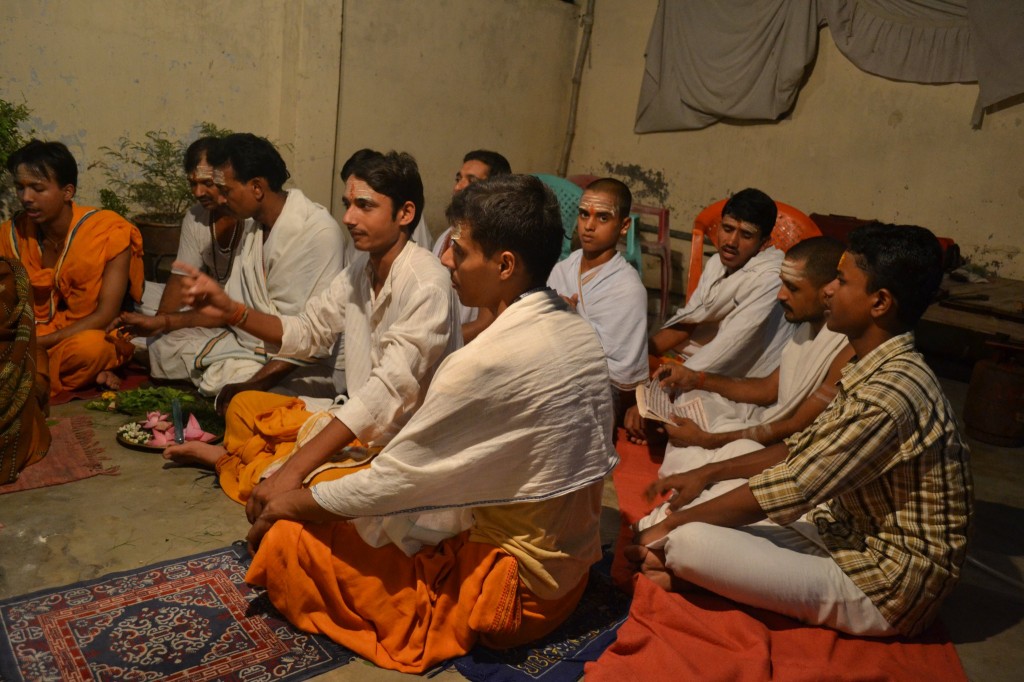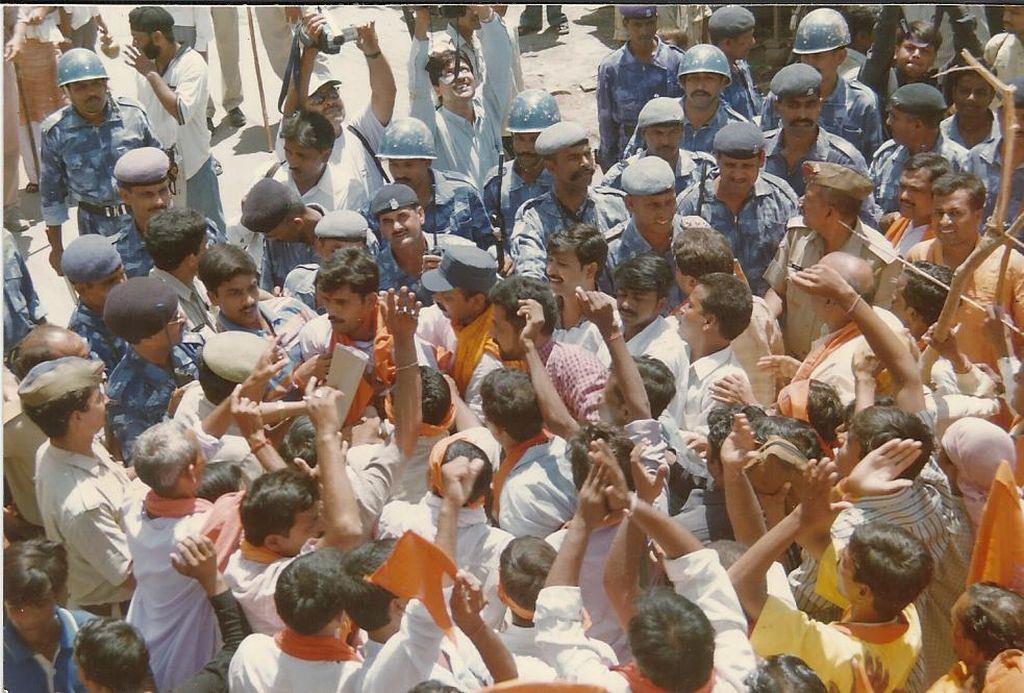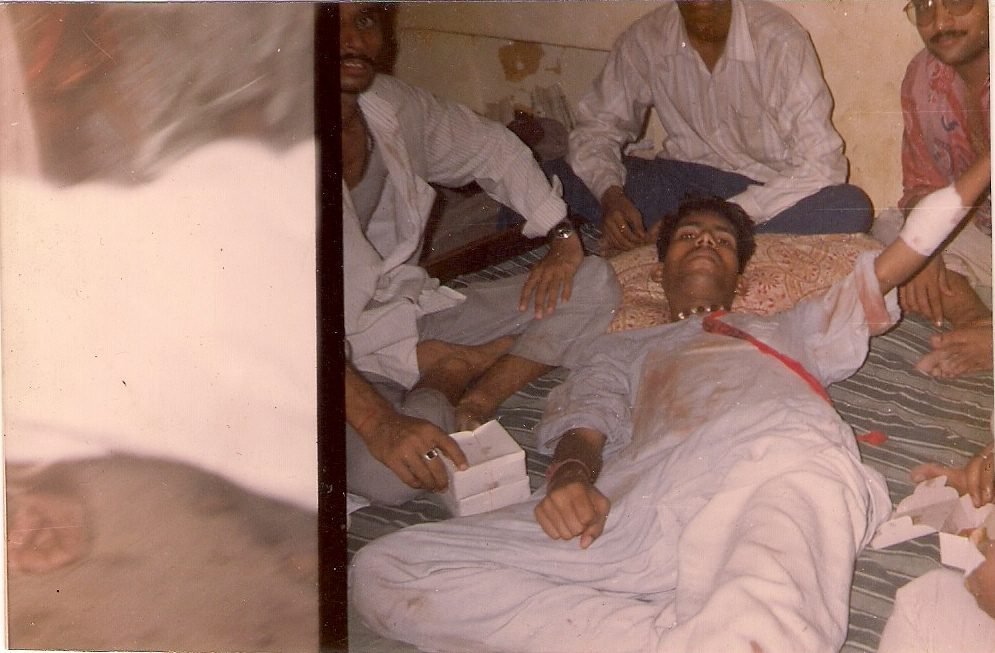The Politician Who Protests with His Life
Arun Pathak is a politician and social worker from Varanasi, known worldwide for his extreme style of protest—even resorting to suicide attempts. His protest against the film Water in the year 2000 brought him global attention. I’d heard about him for years, had seen him in my neighborhood, and had read about him in newspapers and magazines countless times. But I finally had the chance to meet him last year while working with Irene, a researcher from Italy.
When Irene asked me to arrange a meeting with Mr. Pathak, I wasn’t sure I could do it. Arun Pathak had become a very powerful politician, and I thought he would be like any other Indian politician who doesn’t have time for people after elections. My impression of him, however, was completely wrong. I was able to arrange the meeting, and I was genuinely surprised by how helpful and welcoming he was. Irene and I interviewed him at least 20 times over two months, and he was always so gracious. He treated us very well and answered all our questions. I learned a great deal about him during those interviews.
I was truly surprised to hear his stories about his politics, protest style, and struggles. Mr. Pathak’s family was very poor. His father worked as a storekeeper at Jain Dharamshala in Varanasi, and Pathak said they often didn’t have enough money for two meals a day, going to bed on an empty stomach many times. He had to stop his studies and was sent to his uncle’s house in the village because his family couldn’t afford to send him to school.
He returned to Varanasi after only a few months because his uncle wasn’t nice to him either. Pathak finally enrolled in a municipal school, which were free but often considered a waste of time. When he was just 14, he went to a local shop and asked for a job because he wanted to earn some money to help his family. The shopkeeper laughed at him, saying he couldn’t employ a 14-year-old student. Arun Pathak explained that he only wanted a part-time job in the evenings.
After much pleading, the shopkeeper agreed to hire him. Pathak worked for one month, and when he received his first salary of only 30 rupees, he was so happy to share it with his family. But as he was walking home, a few bullies stopped him and took his money, forcing him to buy them alcohol. After drinking, they all went together and beat up his family. Mr. Pathak says his family was beaten because they couldn’t pay their apartment rent on time.
At that time, a political party called Shiv Sena was very popular in India for its work with the youth. Shiv Sena has always been known as a right wing Hindu party. There was a rumor then that Shiv Sena was giving a pistol to all new members, and after hearing this, Mr. Pathak decided to join so he could get a pistol to kill the people who had beaten his family. Since it was just a rumor, he never received a pistol. But Mr. Pathak proudly says he found nuclear bombs instead of pistols in Shiv Sena.
When he talks about nuclear bombs, he’s referring to the hardcore people of Shiv Sena. He says he had always been a leader, even in school, and after joining Shiv Sena, he once again became popular due to his leadership qualities. Many people in his party became his fans, ready to die or kill for him. He organized numerous programs under the banner of Shiv Sena and became very popular. After 11 years of hard work, he became the district chief of Shiv Sena in 2000.
His protests were always massive and a topic of conversation in society. His protests against the films Water, Girlfriend, and Chori-Chori Chupke-Chupke were talked about all over the world. Shiv Sena has always protested against Valentine’s Day celebrations in India, and he also organized huge protests against the festival in Varanasi. His protests against liquor stores, corruption, and several other issues also gained immense popularity. Soon, Mr. Pathak became a major name throughout India.
Mr. Pathak has always been known for his extreme methods. He has consumed poison five times to protest. Once, he cut the veins in his right hand after being stopped from entering a temple. When I asked him why he did such things, he laughed and said, “Nobody listens to the poor. If you are poor and powerless, this is what you do to make people listen to you.” He proudly says that he is the inventor of staging suicide as a form of protest.
I had read many articles claiming the substance he consumed wasn’t actually poison. When I asked Mr. Pathak about it, he showed me his palm, which sweats all the time. He said his body developed this problem after he first consumed poison. He showed me his medical prescription, which states he can’t eat heavy or spicy food and must drink filtered water—all due to the effects of the poison he consumed so many times.
He says it wasn’t just him; others also consumed poison or tried to burn themselves at his request for a protest. After saying this, he called over one of his workers named Bulli. Bulli is 29 years old and consumed poison when he was only 14, to protest against the film Chor-Chori Chupke-Chupke. I asked Bulli several times when I met him alone why he did it, and each time his answer was the same: he did not know. He always says, “Mr. Pathak asked me to, so I did it.” I asked him if he regretted it, and he replied, “Why would I regret it? It was Bhaiya’s (brother’s) order. He knows what’s best for me.”
I was shocked to hear this. How can one person have such control over another? The bigger shock is people’s unwavering belief in Mr. Pathak. He worked with Shiv Sena until 2003 and then left because he was unhappy with how the party was discriminating against certain communities. Shiv Sena was beating up and kicking North Indians out of Maharashtra, a situation that deeply hurt Mr. Pathak, and he decided to leave the party. He formed his own political party and ran it for four years. Finally, in 2007, he realized he needed a bigger platform to raise his voice and fight against major evils. He joined the Bahujan Samaj Party, which is known for working with lower-caste communities and fighting against corruption.
Again, due to his leadership qualities, he was appointed as a co-coordinator for two state assembly seats in Varanasi. During his tenure, he made the Bahujan Samaj Party very popular in Varanasi, where it had previously had no presence. For the past year, he has been somewhat away from politics, devoting his time entirely to social service and religion. He says he’s conducting research on the outcomes of religious practices. To do this, he has hired 11 priests who perform Vedic yagyas (rituals) every day.
These yagyas and other rituals have been going on continuously since October 2010. He says he wants to reveal the truth to society. If there is no outcome from such practices, people should not waste their time. But if performing rituals truly works, they should be done correctly. He believes that rituals don’t seem helpful nowadays because they were created thousands of years ago and need to be changed to fit the times, and he wants to discover what that change should be.
I have been to Mr. Pathak’s place several times, and every time, I see people coming to him for help. He makes some kind of donation almost every day. I’ve seen him offer food to people with leprosy, the blind, or the physically challenged. I’ve seen him pay school fees for poor students or buy them books. I’ve seen him pay for poor people’s weddings. I think he makes every possible kind of donation. He never wears a new piece of clothing until he has donated the same item to a few poor people. I still remember when he bought 12 tracksuits: 11 were donated to beggars on the street first, and only then did he wear one.
I have seen people following him everywhere; I’m sure he has thousands of fans in Varanasi alone. He’s like a star in Varanasi, always surrounded by a minimum of six security guards. He says there’s a threat to his life because so many people don’t like his popularity, so he needs security guards with him all the time. After saying this, he paused for a moment and said, “Can you imagine? I started working at the age of 14 because of my poor family background. My first salary was only 30 rupees, and now I have to spend a good amount of money just on my security.”
It is definitely a huge change for anyone, and Mr. Pathak certainly deserves it. I have now met Mr. Pathak several times, and I like him a lot. I admire his work style, his dedication, his understanding of society, and his incredibly helpful nature. I am sure I have become his fan and would love to see him progress in his life. I personally believe he is a thousand times better leader and politician than anyone I have ever met. Our society definitely needs people like him.



















